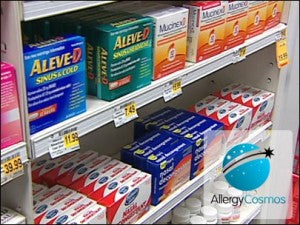A blocked ‘stuffed up’ nose is one of the main symptoms of allergic rhinitis, whether it is seasonal (hay fever) or perennial. A decongestant drug can help relieve a blocked nose, and help you breathe more easily, by reducing the swelling of the main tiny blood vessels in the nose that is the underlying cause of the congestion. Of course, nasal congestion is also a symptom of the common cold, flu or sinusitis. In the case of allergy, congestion is part of the immune response to an allergen like house dust mite or pollen. Decongestants work on nasal congestion whatever its cause, which is why they are often found in cold and flu remedies, as well as in hay fever medication.
Decongestants are generally over-the-counter and in a nasal drop or tablet form. Drops have a more instant effect, but the action of tablets tends to last longer. The most common active ingredients of decongestants are:
- Pseudoephedrine (Sudafed and other brand names)
- Oxymetazoline (Atrin etc)
- Phenylephrine (Sudafed PE etc)
- Xylometazoline (Otrivine etc)
Decongestants only treat the symptoms, not the underlying cause. They will not cure your hay fever! It is important not to use your decongestant for more than seven days at a time because that can cause a problem known as rebound congestion, where the drug makes the nose become more blocked than ever. Be especially wary of getting locked into a vicious cycle of using increasing amounts of decongestant over a prolonged period in an attempt to clear rebound nasal congestion. In this case, the congestion has nothing to do with the original cause and is known clinically as ‘rhinitis medicamentosa’ – in other words, it is caused by the use of the decongestant.
As with all medications, there are some precautions to note before starting on a decongestant. The following groups should avoid the use of decongestants:
- Children under the age of 12 (unless advised by their GP)
- Women who are breastfeeding (unless advised by their GP or midwife)
- People with certain health conditions including diabetes, heart, liver or kidney disease and high blood pressure (consult your GP)
Side effects from decongestants are unusual but may include: nasal irritation, nausea, headaches and (rarely) hallucinations, a sudden rise in blood pressure or anaphylaxis (extreme allergic reaction). If you experience severe side effects, stop the medication at once and seek medical advice. Anaphylaxis (symptoms include swelling of the throat, rash and breathing difficulties) is considered a medical emergency so call 999 if you think this is happening.
Decongestants can also interact with other medicines you may be taking. In particular, they should not be taken with monoamine oxidase inhibitor anti-depressants as this can cause blood pressure to become dangerously high. Also, avoid taking cold and flu remedies and decongestants as you may end up exceeding the maximum dose of active ingredient.
Decongestants can be a useful tool in your allergy management strategy (alongside allergen avoidance). To use them safely and to maximum effect, be sure to always read the label and, if you have questions, don’t hesitate to consult the pharmacist.




